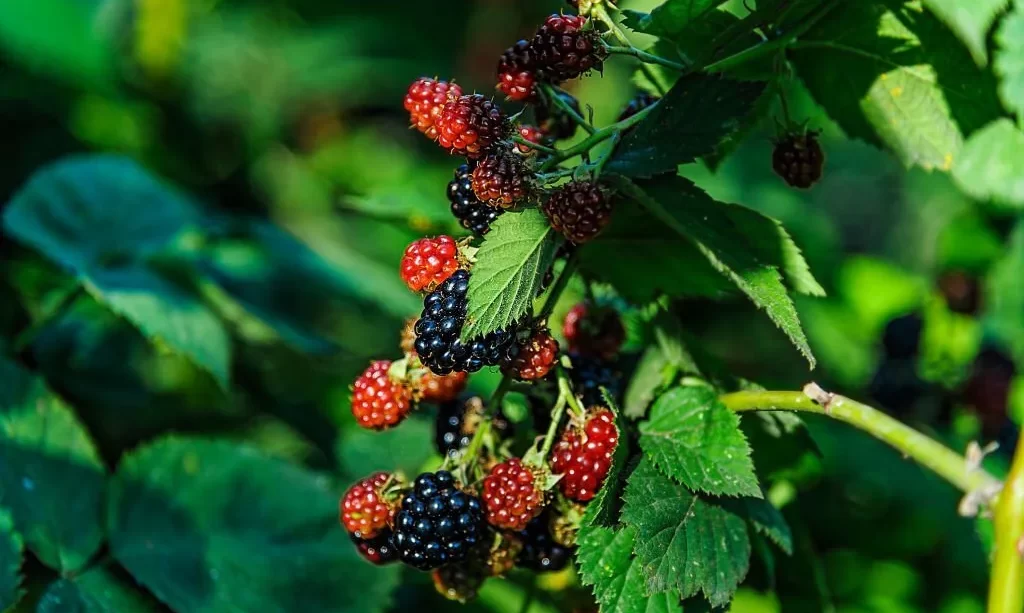When it comes to homegrown berries, raspberries and blackberries are two of the most cherished choices among gardeners. These delectable fruits not only offer sweet rewards but also bring the joy of tending to a fruitful garden. If you’re pondering the possibility of planting raspberries and blackberries together, you’re in for a berry-close relationship that could prove highly rewarding. In this article, we will delve into the intriguing world of these closely related berries and explore whether it’s not only possible but also advantageous to grow them side by side in your garden. Let’s uncover the secrets of cultivating raspberries and blackberries together and enjoy the berry bounty they can provide.
- It is fully rooted in the soil and can be planted immediately upon arrival, weather permitting. Planting and how-to-care instructions will arrive with shipment.
- For Best results, plant in used zones 5-9. Mature Height is 2-3ft, mature spread is 3-4ft.
- Thornless Raspberry bush that can produce quality fruit in mid summer. Plant is not guaranteed to arrive with fruit on it.
- Grows well in full sun.
- Plant will be dormant (no leaves) late fall through the winter months, this is normal. It will leaf out in spring.
Raspberries and Blackberries – A Berry Close Relationship
Raspberries and blackberries share a botanical bond that goes beyond their tempting flavors. Both of these berries belong to the Rubus genus, making them botanical cousins in the plant kingdom. This close relationship is not just a scientific curiosity; it has practical implications for gardeners considering planting them together.
The Rubus genus is vast, encompassing various species and hybrids, each with its own unique traits and flavors. Among these, you’ll find red raspberries, black raspberries, and various blackberry varieties. While there are distinctions between these berries, they share common characteristics that include sprawling growth habits, prickly canes, and the formation of drupelets (small individual fruits) that cluster to create the familiar berry shape.
This shared genetic lineage suggests that raspberries and blackberries can coexist harmoniously in your garden. However, before you dig in and start planting, it’s essential to consider factors like site selection, soil preparation, and care practices to ensure a successful and fruitful berry-growing venture.
Site Selection and Soil Preparation
Selecting the right location for your raspberry and blackberry patch is a critical first step in ensuring their successful coexistence. Both berries thrive in full sun, so choose a spot that receives at least 6-8 hours of direct sunlight daily. Adequate sunlight is essential for fruit production and ripening.
Next, consider soil conditions. Raspberries and blackberries prefer well-drained, fertile soil with a slightly acidic to neutral pH. Before planting, test your soil’s pH level and amend it if necessary to fall within the ideal range. Good drainage is vital to prevent waterlogged roots, which can lead to root rot.
To improve drainage, you can create raised beds or incorporate organic matter like compost into the soil. Well-prepared soil provides a solid foundation for healthy raspberry and blackberry plants.
- True Organic Berry Food Granular Fertilizer: Contains 4 lbs of CDFA, OMRI Listed berry food for organic gardening NPK 5-4-4
- How To Use: Apply monthly during growing season. Our 4 pound bag covers up to 58 sq ft.
- Made With 100% Organic and Natural Ingredients: True Organic plant fertilizers exceed industry requirements for clean sourcing and testing for pathogens and are pet friendly
- Our Specialty: We manufacture all of our products in the USA for the highest quality, ethically sourced, organic plant foods and fertilizers
- Farm To Table: Our plant fertilizers offer more farm grade, certified premium organic content than any plant food sold today to regenerate the soil and produce healthier fruits and vegetables
Planting Raspberries and Blackberries Together
Planting raspberries and blackberries together requires attention to spacing and variety selection. When planting, space the canes of both berries about 3-4 feet apart within rows, leaving at least 6-8 feet between rows. Proper spacing ensures that each plant has ample room to grow and prevents overcrowding.
It’s advisable to choose disease-resistant varieties for both raspberries and blackberries. This reduces the risk of diseases spreading between the two types of berries. When planting, set the canes at the same depth they were in their nursery containers, and water thoroughly after planting.
Remember that raspberries and blackberries both produce canes, and these canes require support. Install trellises or support systems to keep the canes upright, making it easier to manage and harvest the fruit.
- Our blackberry starter plants are carefully selected, ensuring that customers receive healthy and high-quality plants that have the potential to thrive and produce abundant fruit.
- Blackberry plants are relatively easy to grow and maintain, making them an excellent choice for both experienced and novice gardeners. Our starter plants come with detailed planting and care instructions to help customers achieve success.
- Blackberries are known for their deliciously sweet and tangy flavor, making them a popular choice for fresh eating, baking, and preserving. They are also packed with essential vitamins, minerals, and antioxidants, offering numerous health benefits.
- By purchasing our blackberry starter plants, customers are making a long-term investment in their garden. With proper care, these plants can provide an abundant harvest for many years, allowing customers to enjoy homegrown blackberries season after season.
Care and Maintenance
Caring for your mixed raspberry and blackberry patch involves several essential practices to ensure a bountiful harvest. Regular watering is crucial, especially during dry periods, to keep the soil consistently moist. Applying mulch around the base of the plants helps retain moisture, suppress weeds, and maintain a stable soil temperature.
Pruning is a critical aspect of maintenance. Raspberries and blackberries produce fruit on second-year canes, so it’s essential to prune out the canes that have borne fruit after they have finished their productive cycle. This encourages new growth and maximizes future fruit production.
Additionally, monitor your berry patch for pests and diseases. Common issues include aphids, spider mites, and fungal infections. Promptly address any problems with appropriate treatments or preventive measures, such as companion planting.
With proper care and attention to these key factors, your mixed raspberry and blackberry garden can thrive, offering you a delightful harvest of two of nature’s sweetest rewards in one fruitful space.
Benefits of Planting Together
Planting raspberries and blackberries together can offer a host of benefits for gardeners. One of the primary advantages is efficient space utilization. By combining these two berry varieties, you make the most of your garden real estate, allowing you to enjoy a diverse range of flavors without the need for separate patches.
These berries can also complement each other in terms of taste and harvest times. Raspberries typically ripen earlier in the summer, while blackberries follow suit in late summer or early fall. This means you can extend your berry harvest season, delighting in fresh-picked berries over an extended period.
Moreover, there can be pollination benefits to growing raspberries and blackberries together. Bees and other pollinators attracted to one berry type may inadvertently cross-pollinate the other, potentially resulting in higher yields and better fruit development.
Potential Challenges
While the idea of growing raspberries and blackberries together is enticing, it’s essential to consider potential challenges. One challenge is the competition for resources, including water and nutrients, between the two berry types. Be vigilant in providing adequate irrigation and nutrients to ensure both thrive.
Additionally, the shared genetic lineage of raspberries and blackberries means they can be susceptible to similar diseases and pests. This close relationship may increase the risk of certain issues spreading between the two types of berries. Choosing disease-resistant varieties and practicing good garden hygiene can help mitigate this risk.
Conclusion
In the journey of deciding whether to plant raspberries and blackberries together, you’ll find a delightful blend of advantages and challenges. The close botanical relationship between these berries can be harnessed to create an efficient, extended, and bountiful harvest. However, to reap these rewards, you must carefully consider factors like site selection, variety choice, and attentive care practices.
With proper planning and care, you can enjoy the synergy of raspberries and blackberries in your garden. The sweet taste of success will come not only from the fruit but from the satisfaction of nurturing a thriving berry patch that brings the joy of nature’s bounty right to your doorstep. So, whether you’re a seasoned gardener or a novice, the prospect of growing these berries together is a delightful endeavor worth exploring.






